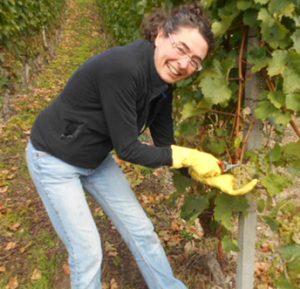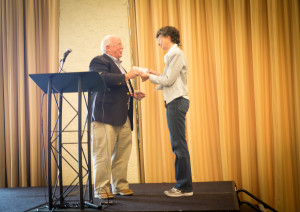Each year at the Annual Conference of the Society of Wine Educators, the Banfi Award is given to a CWE Candidate with the highest scores among all of the year’s candidates. The winner of the Banfi Award must also have succeeded in passing all seated sections of the CWE Exam on the first attempt—a feat accomplished by a mere 12% of all CWE Candidates.
At this year’s SWE Conference in Portland, Oregon, it was our pleasure to award the 2017 Banfi Award to Lucia Volk, CWE. Neill Trimble, SWE’s First Vice President and Vice President of Advertising and Marketing for Banfi Vineyards, presented Lucia with the award—which includes a $2,500 honorarium—during Saturday’s luncheon.
Lucia Volk is a wine educator who lives in San Francisco. She runs a small wine education business, MindfulVine, offering small, tailored wine tastings in people’s homes. Specializing in Old World wines, she especially loves to teach about the joys of drinking Riesling. A native of Germany, Lucia likes to promote lesser known German wine regions. Lucia is also a trained anthropologist and teaches at San Francisco State University.
After the luncheon was over I asked Lucia a few questions about her journey to preparing for the CWE Exam. I am sure what she had to say will prove useful to future CWEs, future CSWs, and all serious students of wine!
As you prepared for the CWE exam, what were some of your most effective study techniques?
There are dozens of study techniques—and everyone needs to find what works for them. With that being said, I am a big believer in absorbing small chunks of information at regular intervals. That means 15 to 30 minutes of study a day, whether it is reading through the CSW Study Guide or Workbook, the CWE Manual, or digesting the Wine Bible or any of the other books on the Study List.
I am also a big believer in simulating exam situations: I took and retook all the multiple choice questions in the Workbook, as well as the Book Club chapter quizzes. I labeled and relabeled the maps in the workbook, until I had memorized where the AVAs were. I used practice essay questions from the CWE manual to write out essays at home, timing myself doing it. Then I would look up information I missed or that I felt uncertain about, and rewrite the essay one more time. I also made up more essay questions.
As for the tasting portions of the CWE, I prepared by tasting a LOT. I tasted by country, first looking at the label and writing down the flavor profile following the logical tasting rationale laid out by SWE. A day later, I would revisit the same bottles again, this time pouring them out of brown paper bags. I did a lot of repetition using the same wines, until I was certain I knew what I was tasting. Investing in a Coravin helps at this stage, if you don’t already own one!
What part of the CWE did you find the most challenging?
The faults and imbalances identification was the most challenging for me, simply because I had not tasted faulty wine very often. The fault kit is therefore essential. During the exam, it is important not to overdo the tasting of the faulty wines, and try and determine as much as possible by the color, texture, and smell. I did not rush and gave my nose and tongue time to rest before moving on to the next glasses. Honestly, I did not feel very confident going into this part of the exam, but I went in thinking I would give it my best shot… and I passed.
Do you have any other advice for certification seekers?
I recommend learning by doing as much as possible, whether it is labeling maps, circling multiple choice answers, writing mock questions of your own, speaking through the logical tasting rationale out loud, or writing practice essays—doing is better than simply reading or memorizing quietly. The SWE’s CWE Boot Camp is of course another way to review exam materials, and most importantly, boost your confidence.
I also enlisted my friends as “volunteer” students and explained certain concepts to them such as “What makes wines of the Loire so special?” or “Why do some wines sparkle?” or “How do you make wines taste sweet?” I paid them for their time with guided tastings, which they enjoyed. Teaching the material reminded me why I wanted to take the CWE exam and kept me motivated.
Congratulations, Lucia! You give us all hope!
The Banfi Award is named in honor of, and sponsored by Banfi Vintners. Banfi Vintners is a long-running sponsor and supporter of the Society of Wine Educators.
Post authored by Jane A. Nickles, CSE, CWE – your blog administrator
Are you interested in being a guest blogger or a guest SWEbinar presenter for SWE? Click here for more information!

